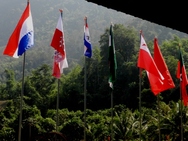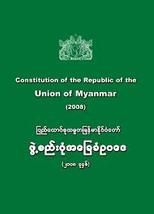
By Paul Sztumpf
For the past 60 years the ethnic nationalities of Burma have been in rebellion against the union government. Central to that revolution is the call for a “federal union” and the question of the nature of the Union of Burma, its constitution and how its many people live together. As one Karen activist put it to me, “All governments in Burma, past and present, under democracy and dictatorship alike, have refused to accept Burma as a country of many ethnicities and religions. They want to impose their Burman Buddhist vision of Burma on everyone.” In my view this is best illustrated by, Thein Sein proposed in a letter to Shwe Mann that a marriage law and three other laws be drafted by the National Assembly to “preserve race and religion.” A countries constitution can be regarded as a framework for governing a country which encapsulates the philosophy of the society.
The constitution is the political and lawful foundation, upon which the country is built. It’s importance cannot be overstated, particularly for a country such a Burma/Myanmar, with its muti-ethnicity and different religions. The 2008 Myanmar constitution, encapsulates the philosophy of the former Generals such as Shwe Mann and Thein Sein but unfortunately many ethnic nationals feel it also reflects the views of many Burmans, especially when they see the racist actions of Buddhist monks such as Wirathu. It is not just the undemocratic nature of the constitution with its 25 % appointed military nominated seats in Parliament, or the clauses that prohibit Daw Aung San Suu Kyi from becoming president, that is so very unacceptable. But it is the centralist nature of power that is framed in the constitution that is of paramount concerns to many ethnic nationalities. Local governance and local government is key to any genuine peace process, whatever the exact nature of the constitutional definition of the Union of Burma. The call for a federal Burma is a means of expressing the need for real and accepted devolution of power.
For the past 60 years the ethnic nationalities of Burma have been in rebellion against the union government. Central to that revolution is the call for a “federal union” and the question of the nature of the Union of Burma, its constitution and how its many people live together. As one Karen activist put it to me, “All governments in Burma, past and present, under democracy and dictatorship alike, have refused to accept Burma as a country of many ethnicities and religions. They want to impose their Burman Buddhist vision of Burma on everyone.” In my view this is best illustrated by, Thein Sein proposed in a letter to Shwe Mann that a marriage law and three other laws be drafted by the National Assembly to “preserve race and religion.” A countries constitution can be regarded as a framework for governing a country which encapsulates the philosophy of the society.
The constitution is the political and lawful foundation, upon which the country is built. It’s importance cannot be overstated, particularly for a country such a Burma/Myanmar, with its muti-ethnicity and different religions. The 2008 Myanmar constitution, encapsulates the philosophy of the former Generals such as Shwe Mann and Thein Sein but unfortunately many ethnic nationals feel it also reflects the views of many Burmans, especially when they see the racist actions of Buddhist monks such as Wirathu. It is not just the undemocratic nature of the constitution with its 25 % appointed military nominated seats in Parliament, or the clauses that prohibit Daw Aung San Suu Kyi from becoming president, that is so very unacceptable. But it is the centralist nature of power that is framed in the constitution that is of paramount concerns to many ethnic nationalities. Local governance and local government is key to any genuine peace process, whatever the exact nature of the constitutional definition of the Union of Burma. The call for a federal Burma is a means of expressing the need for real and accepted devolution of power.



 RSS Feed
RSS Feed

